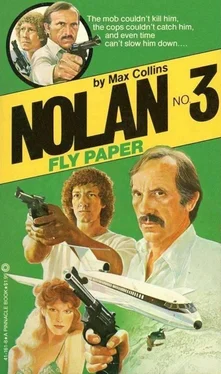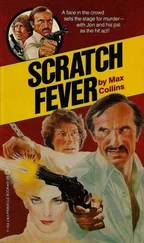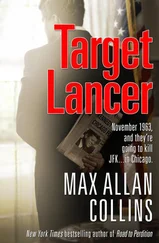Max Collins - Fly Paper
Здесь есть возможность читать онлайн «Max Collins - Fly Paper» весь текст электронной книги совершенно бесплатно (целиком полную версию без сокращений). В некоторых случаях можно слушать аудио, скачать через торрент в формате fb2 и присутствует краткое содержание. Город: New York, Год выпуска: 1981, Издательство: Pinnacle Books, Жанр: Криминальный детектив, на английском языке. Описание произведения, (предисловие) а так же отзывы посетителей доступны на портале библиотеки ЛибКат.
- Название:Fly Paper
- Автор:
- Издательство:Pinnacle Books
- Жанр:
- Год:1981
- Город:New York
- ISBN:нет данных
- Рейтинг книги:4 / 5. Голосов: 1
-
Избранное:Добавить в избранное
- Отзывы:
-
Ваша оценка:
- 80
- 1
- 2
- 3
- 4
- 5
Fly Paper: краткое содержание, описание и аннотация
Предлагаем к чтению аннотацию, описание, краткое содержание или предисловие (зависит от того, что написал сам автор книги «Fly Paper»). Если вы не нашли необходимую информацию о книге — напишите в комментариях, мы постараемся отыскать её.
Fly Paper — читать онлайн бесплатно полную книгу (весь текст) целиком
Ниже представлен текст книги, разбитый по страницам. Система сохранения места последней прочитанной страницы, позволяет с удобством читать онлайн бесплатно книгу «Fly Paper», без необходимости каждый раз заново искать на чём Вы остановились. Поставьте закладку, и сможете в любой момент перейти на страницу, на которой закончили чтение.
Интервал:
Закладка:
Max Allan Collins
Fly Paper
This is for Terry Beatty,
who understands Jon.
“Sky piracy... involves the interests of every
nation, the safety of every traveller, and the
integrity of that structure of order on
which a world community depends.”
R. M. Nixon“Take me to Mexico.”
D. B. CooperPrologue: Pre-Flight Check
The suitcase itself was a bomb. It would be harmless enough going through baggage check, and no matter how roughly it was tossed into the cargo hold, it wouldn’t explode: all the jostle in the world couldn’t do that. Not till I arm it, he thought. By remote control, when the plane is in the air. Even then, nothing could set it off. Except his finger, on the right button.
Not that he wanted to blow up a plane, killing all the people on board, himself included. He wanted no part of that. But it was a possibility, a calculated risk he had to take; high stakes, high risk, simple as that. A more desperate man wouldn’t have twitched an eye at such a prospect, and his concern for his own life and the lives of others was proof positive that he was anything but a desperate man.
He was, rather, a man who’d made a decision. A difficult one at that, reached through calm, rational consideration. And as for the plane blowing up and people getting killed, well, that would be someone else’s decision: the decision of the airline official or FBI agent or heroic crew member who might force upon him the pushing of that final button.
He’d decided, too, that only under the most extreme circumstances would he even consider pushing that button before all the passengers (except a handful of hostages) were off the plane. He was not a monster, after all: the killing of perhaps several hundred people was not something his conscience could easily bear, even if that killing was forced upon him. Of course if it came to that, his conscience would be blown to pieces along with everything and everybody else, wouldn’t it?
But that was the most far-fetched of possibilities. That was not according to his plan. This is how it will go, he thought: after commandeering the plane, he would direct the pilot to a specific airport, at which the bulk of the passengers would be allowed to disembark. Remaining on the plane would be crew members (pilot, copilot and navigator), as well as a stewardess (a volunteer) and some passenger hostages (likewise volunteers). After the ransom money was delivered, the passenger hostages would be released, and the plane would again take off.
He felt no moral responsibility toward the lives of any of these people. The crew members were, after all, professionals highly paid to bear the hazards of flying, including that of skyjacking. And likewise, he couldn’t be expected to feel concerned about the passengers who volunteered to stay on as hostages. They would be volunteers, who’d made their own decision to stay on the plane, wouldn’t they? He was not responsible.
He was twenty-six years old and looked eighteen, with an eternally boyish face, like Johnny Carson. His hair was fair and short, neatly trimmed, neatly combed; he was freckled and blue-eyed. Despite the sloppiness of his surroundings, he was dressed in conservative, tidy work clothes: a deep brown sweatshirt with the words “Greystoke Teacher’s College” spelled out in white, light brown jeans, brown Hush Puppies and dark socks. His was the type of appearance many fathers long for in their sons; he was just what the recruiting officer was looking for: he was clean-cut.
He was hunched over the workbench in a basement that looked like a warehouse of a small electronics firm after a rather untidy burglary. While the workbench itself was well ordered, the room surrounding was chaos: supplies, abandoned projects, empty cartons, stacks of Radio Shack and other electronics catalogs, all were scattered about like so much refuse. Still, mess or no mess, he knew where to find whatever he needed, whenever he needed. To the uninitiated, the basement was a mess; to him it was a filing system.
The basement also held the artifacts of a childhood not entirely given up: a table with an electric train, still functioning, though one would have had to do a ballet around the boxes and unfinished projects to get to the control; a go-cart, mostly disassembled, awaiting the mood to strike its owner to put Humpty Dumpty back together; a guitar amplifier he’d half finished back in early high school, when he’d thought for a while he might take up that instrument; a motorcycle from that same era, a lightweight Honda, also still functioning, or almost — as soon as he got the engine put back together it would be; and off in one corner, stacks of science fiction comic books and pulp digests, as well as an overflowing box of tattered Big Little Books, space stuff mostly (“Buck Rogers,” “Flash Gordon,” “Brick Bradford”), old junk left from his older brother’s childhood but also a fond part of his. The yellowed pages of those little books, as well as the s-f comics and pulps he’d bought himself, stirred his sense of adventure as much in their way as the go-cart and Honda had in theirs.
Upstairs, his wife kept things orderly. When they’d moved to this modest but cozy house from their small apartment (which had been more his workshop than their apartment, every room but the bath looking not unlike this basement), she had asked him if he could limit his projects and such to the downstairs. Though he could have overriden her if he’d wanted to, he’d deferred to her wishes. After all, she was his wife and deserved a nice home, didn’t she? He stayed downstairs.
Now he was rechecking all his leads, making doubly sure they were firmly soldered to the various solid-state chips that made up his remote control system. He was good at this sort of thing. He was an all-around handyman, good at anything mechanical — no electronics genius, maybe, but he knew what he was doing. There were guys with degrees in chemistry and biophysics and the like (his degree was in business) who had the knowledge, sure, but not the knack, not the knack for putting things together, making them work. He could make something out of nothing. Give him a pile of junk and a little time, and he would provide the sweat and imagination and come up with something special. The suitcase/bomb, for instance. He’d made that from, well, he’d made it from crap. Literally. Fertilizer, that is, nitrate-based fertilizer purchased at a local farm supply outlet. The nitrates were the key, and utilizing a variation on standard industrial “cook-book” recipes, he’d had no trouble processing the nitrate-based fertilizer into 10 x 4 x 3-inch blocks of plastic explosive, which looked like nothing more than six loaves of unbaked rye bread.
Next to the suitcase on the work bench were three items of great importance.
The first was a light, compact, but serviceable parachute, one he’d used when skydiving was a hobby of his several years ago, an emergency chute, worn strapped to the stomach.
Next was a portable citizen’s band radio, sender/ receiver, about the size of a small hardcover book; this would provide communications when he hit the ground, so that his wife could come pick him up (she’d be receiving and sending on a C.B. in the car). The C.B. had a black, slightly padded case with a clip that would slip over his belt.
And, finally, there was the pocket calculator, an inconspicuous block of black plastic with numbered push-button face, not much bigger or thicker than a deck of playing cards. In this case, however, the deck was decidedly stacked: he had wired in several special functions in addition to the calculator’s usual ones. Except for a chip of circuitry that ran the calculator (whose bulk was primarily due to the panel of push buttons, and the window that displayed the answer to whatever mathematical question you might ask via those buttons) the inside was hollow, and there’d been plenty of space for the extra wiring. He’d wired in a signal, using a frequency higher than the regular broadcast band, one that would penetrate sufficiently into the cargo hold of the plane. This high frequency would be diffracted throughout the entire compartment, seeking out the suitcase, whereas a lower frequency would be blocked out by the metal of the plane. Four times four would arm the suitcase/bomb. Four times four times four would detonate.
Читать дальшеИнтервал:
Закладка:
Похожие книги на «Fly Paper»
Представляем Вашему вниманию похожие книги на «Fly Paper» списком для выбора. Мы отобрали схожую по названию и смыслу литературу в надежде предоставить читателям больше вариантов отыскать новые, интересные, ещё непрочитанные произведения.
Обсуждение, отзывы о книге «Fly Paper» и просто собственные мнения читателей. Оставьте ваши комментарии, напишите, что Вы думаете о произведении, его смысле или главных героях. Укажите что конкретно понравилось, а что нет, и почему Вы так считаете.












